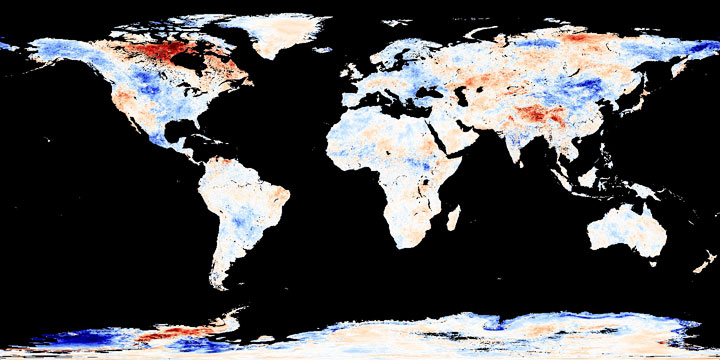TORONTO – For the second month in a row, Earth’s temperature has broken records.

On Monday, the National Oceanic and Atmospheric Administration released its global analysis for the month of June. It found that Earth’s combined average temperature over land and ocean surfaces was the highest on record – up from 15.5 C to 16.22 C. That was 0.72 C above the 20th century average.
Not only that, but the same average surface temperature (combined land and ocean) from January to June was 0.67 C above the 20th century average of 13.5 C tying 2002 as the third warmest on record.
And this wasn’t a first.
May 2014 was the hottest May on record at 0.74 C above the 20th century average temperature of 14.8 C. And going back to April, that month tied 2010 as the highest on record for the month at 0.77 C above the 20th century average. In fact, the past six months have been the third warmest month on record trailing behind 2010 and 1998. It is the 352nd warmer-than-average month in a row and the period from April to June was the warmest April to June period.
“We are living in the steroid era of the climate system,” NOAA climate monitoring chief Derek Arndt said.
Almost every continent (Antarctica being the anomaly) experienced a heat record for June, particularly in New Zealand, northern South America, Greenland, central Africa and southern Asia.
(Click here for a hi-res version.)
NOAA climate scientist Jessica Blunden said that the expected El Nino – a warming sea surface temperature trend that has shown signs of beginning in the Pacific Ocean – could warm things up even further.
“What we’re seeing is that it hasn’t even developed yet and we’re already seeing record warmth, which shows you that you have the temperatures rising from the underlying cause of climate change, and then you have these natural patterns,” she said.
“With this El Nino coming up, we definitely have the potential to have one of the warmest years on record if not the warmest,” Blunden said.
Since the start of 2014, almost every month has seen record warmth for their respective month. Only February, with its polar vortex pulling colder than normal air into Canada and the United States, was not among them. February was the 21st warmest on record.
All 12 of the world’s monthly heat records have been set after 1997, more than half in the last decade. All the global cold monthly records were set before 1917.







Comments